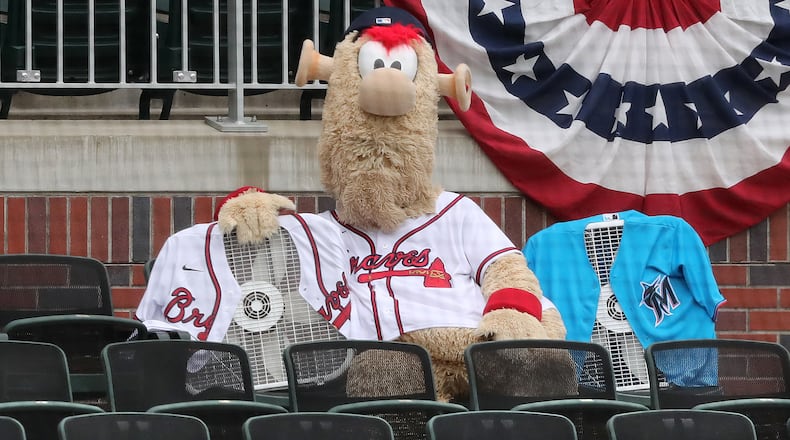What we’re about to watch is baseball as no one has ever seen it. It will be staged differently – no fans. It will be played differently – the DH in both leagues, a 10th inning that starts with a runner on second base. It’s scheduled to last half as long as the shortest season – 1981, when a strike washed out two months – on record.
It’s supposed to end in the usual fashion, with 10 teams playing beyond September, except that word came late Wednesday via Jon Heyman of the MLB Network that the sport and its players were discussing expanding THESE playoffs to 16. Which would, you’d have to say, take some guts. Nobody is sure if baseball can make it to October, let alone sort things out once there. But that’s MLB for you, making it up as it goes along.
To give the league a dollop of credit: A month ago, we weren’t sure owners and players could shelve their usual bickering long enough to play at all. That they finally did was something of a wonder. That they took so long to do it means that the sport is starting not around July 1, when the virus was only beginning to spike, but closer to Aug. 1, as the spikes continue apace.
MLB’s summer camp saw some big names test positive or opt out, but the 30 teams have mostly muddled through. (Excepting the poor Toronto Blue Jays, who aren’t allowed to play in Canada and were refused temporary residence in Pittsburgh. Did we mention that much of this is seat-of-the-pants stuff?) A series of opening days are at hand, albeit four months behind schedule. Baseball will try to have a season, the key word being “try.”
Baseball will become the first U.S.-based team sport during this pandemic to ask its players to travel. The NBA has its bubble. MLS began in the same bubble. The NHL has its two Canadian hubs. (One being Toronto. Go figure.) MLB floated trial balloons about a season staged entirely in Arizona – not sure you’d want that now – or in Arizona, Florida and Texas, meaning yikes. Ultimately the sport chose to let all teams play at home. The Jays’ situation gummed that up, but still: There’ll be travel.
Not as much travel as in ordinary times. The Braves will go no farther west than St. Louis, no farther north than Boston. (Toronto’s off the board.) They’ll play 40 games against the four teams from the National League East. They’ll play 20 against the five clubs that comprise the American League East. They’ll see nobody else until October, assuming they qualify, assuming there is an October.
Credit: Atlanta Braves
The usual bromides regarding a baseball season – it’s a marathon, not a sprint; regular seasons hinge largely on rotations – will not apply. You can’t pace yourself if your season lasts but two months. (MLB clubs are accustomed to playing their 60th game around Memorial Day.) If this year’s playoff remains at 10, at least 20 teams will still hold a realistic chance to qualify as of Labor Day. Over a six-month season, a manager can afford to sacrifice some winnable games for the sake of preserving arms. Over the course of 60 games, you might get away with that once.
We say again: No fans will be allowed to attend games. Baseball hasn’t quite said as much out loud, but it surely hasn’t filled anyone with false hope. You can watch on TV, and there’ll be pumped-in crowd noise, which everybody hates except TV, an industry that deplores the concept of quiet.
What some of us came to like about baseball – that its regular season undulates, as opposed to lurching – won’t be in evidence this time. This will be a season thrown into a trash compactor, and it might seem a little … well, trashy. Can’t fault MLB for that. The league didn’t conjure up the coronavirus. The proverbial eggs have been broken. All baseball can do is hope to whip up some sort of omelet a few folks might find appetizing.
And who knows? Maybe you’ll like streamlined baseball. Haven’t we been complaining for decades that the games last too long? The games mightn’t exactly speed up in 2020 – though there surely won’t be any 18-inning affairs – but there won’t be nearly as many of them. In a world of shortened attention spans, might that prove a good thing?
The question of “legitimacy” will hang over whatever happens this season. Let’s resign ourselves to that here and now. Somebody hitting .400 over 60 games wouldn’t be the same as doing it over 162. It would still be something, though. Whoever wins this World Series, assuming there is a World Series, will never be granted the stamp of authenticity that usually accompanies the Commissioner’s Trophy. That’s OK, too. These are desperate times, and those call for … well, you know.
The biggest unknown facing baseball as it begins is how far it can get without halting. It was believed the virus would slacken over the summer months and then snap back come the fall. If it’s much worse in September than it is today, nobody will be playing anything. As we settle in to watch, we must bear that in mind. MLB has made – and continues to make – its plans. The virus could render all plans null and void.
About the Author
The Latest
Featured



